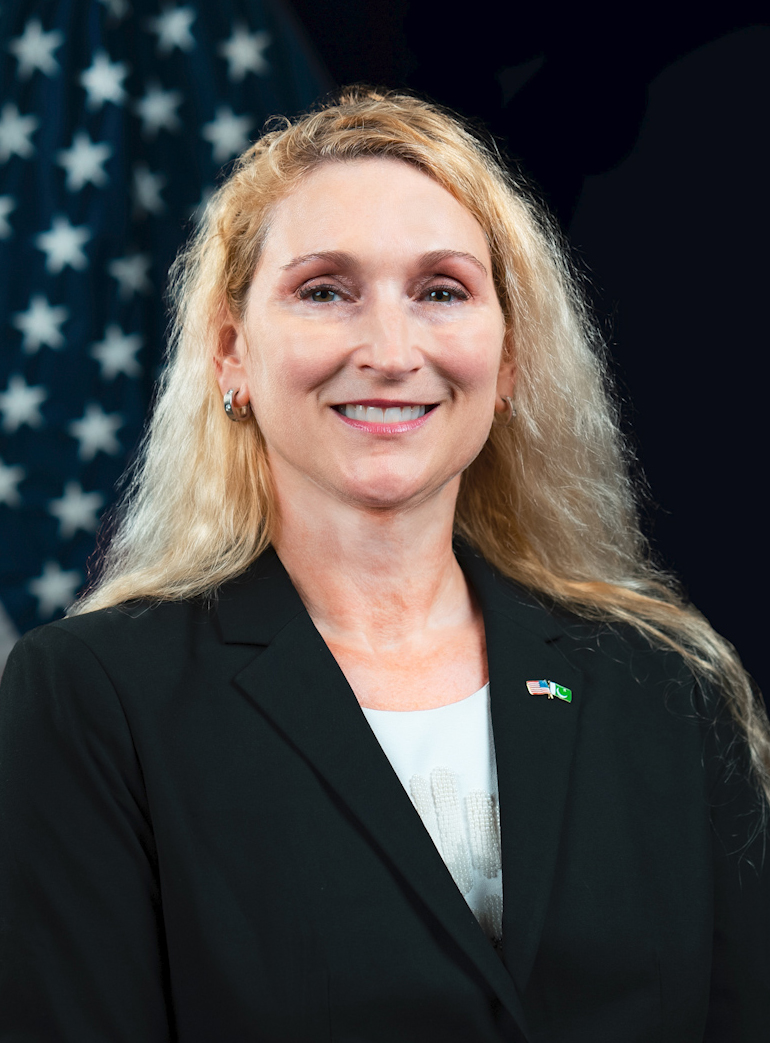With Guyana and Suriname the only countries in the 15-member Caricom bloc supporting the joint statement which called for democracy in Venezuela, the United States has expressed its disappointment but is grateful this country agrees that the Nicolas Maduro regime should support the will of Venezuelans.
“That’s quite disappointing, actually. For us, it seems very clear to support democracy. Certain things need to be done with regard to the elections. And if those other countries chose not to sign on, that is their right. But we are disappointed,” United States Ambassador Nicole Theriot said on Wednesday on the sidelines of the mineral mapping agreement signed between Guyana and US company Global Ventures Consulting.
Following heavy protests in Caracas and in response to election-related criticism, Venezuela expelled diplomats from Argentina, Chile, Costa Rica, Panama, the Dominican Republic and Uruguay, Reuters has reported .
A number of anti-Maduro supporters have also been incarcerated and there have been reports of some 20 deaths related to the elections. Global human rights groups have bemoaned the spiralling situation and have called for Maduro to give in to the will of the people.
On August 16th, and following a meeting in the Dominican Republic, the US State Department released a joint statement with signatories from 20 states which included only Guyana and Suriname from Caricom. The other signatories are Argentina, Canada, Chile, Costa Rica, Czech Republic, Dominican Republic, Ecuador, El Salvador, Guatemala, Italy, Morocco, the Netherlands, Panamá, Paraguay, Perú, Portugal, Spain, Uruguay, the UK, the US, Ukraine and the European Union.
“The undersigned countries, meeting in Santo Domingo de Guzman make a strong appeal for wisdom and restraint in Venezuela. At this decisive juncture for Venezuela and the region, all social and political actors must exercise the utmost restraint in their public actions,” the statement said.
“Acceptance and respect for the dignity and integrity of all individuals are the essential principles upon which the peaceful coexistence in our societies is built. We urge for the respect of democratic principles, as well as the human rights and fundamental freedoms of all Venezuelans, particularly the freedom of peaceful assembly and the freedom of expression. We are concerned that this reality currently does not exist in Venezuela. Reports of arbitrary detentions of Venezuelans without due process are alarming, and therefore we urgently call for their immediate release,” it added.
Theriot said that Washington had wanted the support of the entire region but was nonetheless glad that Guyana and Suriname joined with the other countries in defence of democracy.
“We are very pleased that the governments of Guyana and Suriname signed on to that statement. It’s incredibly important to us that we are all together in defending democracy in this region and globally,” she said.
“And it meant a lot to us to have those partners in this region, especially Guyana becoming a global leader. It meant so much to have Guyana on that statement. We’re very, very grateful and we hope that it will have an impact on President Maduro and his administration, moving forward.”
The statement expressed deep condemnation of the repression of protesters and the violence that has claimed the lives of many Venezuelans in the post-election context. “We urgently call on Venezuelan authorities to end the violence and release all those who have been detained, including opposition representatives. Furthermore, we request the immediate return of the Office of the United Nations High Commissioner for Human Rights to Venezuela, and call on Venezuela to ensure the necessary conditions for it to fully carry out its mandate,” it stated.
“In addition, we call on Venezuela, as a state party to the Caracas Convention on Diplomatic Asylum of 1954, to comply with its provision by issuing the safe passage that will allow the six asylum seekers currently residing in the official residence of the Republic of Argentina to safely leave Venezuelan territory.”
The countries pointed out that they were taking note of a preliminary report by the United Nations Expert Panel on the presidential election in Venezuela which indicated that the National Electoral Council (CNE) of Venezuela was yet to present the electoral records that substantiate the validity of the results announced on August 2.
It noted that a digital version of more than 80% of the electoral records had been published, which shows a different outcome than that reported by the CNE.
“Consequently, we request the immediate publication of all original records and the impartial and independent verification of those results, preferably by an international entity, to ensure respect for the will of the Venezuelan people as expressed at the polls. Any delay in this process calls into question the August 2, 2024, official proclamation,” the statement said.
“Our nations have previously appealed for peaceful dialogue and negotiations to resolve serious conflicts. Now more than ever, Venezuela must honour that legacy to restore peaceful coexistence, public safety and political stability, which according to accounts by the Independent International Fact-Finding Mission on the Bolivarian Republic of Venezuela of the UN Human Rights Council, are being threatened by the Venezuelan security authorities,” it added.
The signatory countries stated that the situation in Caracas “calls for a broad, inclusive, and good-faith dialogue to facilitate a political agreement that fosters national reconciliation, peace, public security and democracy in Venezuela.
“We are committed to supporting all efforts in this direction, and always advocating for a genuinely Venezuelan solution in which democracy and justice, and peace and security will prevail.”






